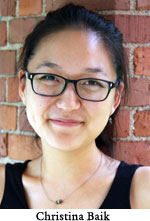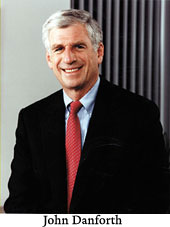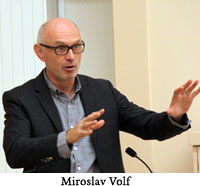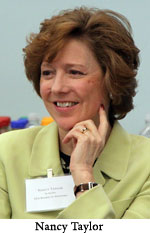In the run-up to the Nov. 6 elections, YDS faculty, alumni, and students are thinking about American values.
Hot off the press is the fall 2012 issue of Reflections, YDS’s magazine of theological and ethical inquiry, entitled “Who Are We? American Values Revisited,” which includes contributions from faculty, alumni and students, prefaced with a foreword by Dean Gregory Sterling.
 Some other examples of pre-election ruminations: Miroslav Volf, the Henry B. Wright Professor of Theology, has entered a series of Facebook posts that cite specific concerns and values, biblical contexts, and questions for candidates. Former Senator and U.S. Ambassador to the U.N. John Danforth ‘63 B.D. ‘63 LL.B. was the keynote speaker at a congressional breakfast held in conjunction with a two-day Washington conference aimed at encouraging Americans of different views to engage one another with respect, dignity and honor.
Some other examples of pre-election ruminations: Miroslav Volf, the Henry B. Wright Professor of Theology, has entered a series of Facebook posts that cite specific concerns and values, biblical contexts, and questions for candidates. Former Senator and U.S. Ambassador to the U.N. John Danforth ‘63 B.D. ‘63 LL.B. was the keynote speaker at a congressional breakfast held in conjunction with a two-day Washington conference aimed at encouraging Americans of different views to engage one another with respect, dignity and honor.
The fall issue of Reflections will be in mailboxes early in October, and a number of churches have preordered multiple copies for use in adult Bible study classes. Bulk orders are available by clicking here.
The issue features articles, poetry and artwork that explore the embattled ground of contemporary values and our spiritual politics: Who are we as a nation now? Are certain values at risk of neglect in this cultural moment? How can our faith traditions inject wisdom into turbulent times?
 Among the contributions:
Among the contributions:
• U.S. Senator Chris Coons ‘92 M.A.R. of Delaware says bipartisanship is still possible in Congress, offering as an example the aid to Africa. He thinks prayer breakfasts help—a place where politicians see each other there as humans, not labels.
• Nancy Taylor ‘81 M.Div., senior minister at Old South Church in Boston, looks back to examples from historic New England politics to ponder whether religious leaders today can reclaim some moral authority and hold politicians to their promises and their values.
• Bob Massie ‘82 M.Div., president of the New Economics Institute, makes a plea for a transformation of cultural values that reject the “unlimited growth” myth that we live by, arguing that it is unsustainable.
• George Rupp ‘67 B.D., president and CEO of the International Rescue Committee, offers an international perspective on the tensions between secular individualism and traditional notions of community.
 • Kathryn Tanner ‘79 B.A., ‘85 Ph.D., professor of systematic theology, contributes an essay that examines the role of religion at a time when social concern has taken a back seat to popular sentiments like “government-off-my-back” and “it’s-my-money-and-I-want-to-keep-it.”
• Kathryn Tanner ‘79 B.A., ‘85 Ph.D., professor of systematic theology, contributes an essay that examines the role of religion at a time when social concern has taken a back seat to popular sentiments like “government-off-my-back” and “it’s-my-money-and-I-want-to-keep-it.”
• Three current students contribute observations: Christina Baik ‘13 M.A.R. writes about what adult America can learn from middle schoolers about reconciliation. Matthew Vogel ‘13 M.A.R, ‘13 J.D. writes about lessons learned during his years at the Catholic Worker community, founded by Dorothy Day. Christopher Timm ‘14 M.A.R. writes about the spirituality of protest against WTO globalization, as featured in a new documentary he directed.
• An alumni section features short meditations by 15 YDS alums. Their subjects include hospitality, doctrine of sin, humility, biblical ideas of community.
Each of the election Facebook posts by Volf lay out a “concern,” a “value,” a “rationale,” the “debate,” and a “question” for candidates. The “Value #2” post, for example, is:
Concern: the Poor
 Value: The poor—above all those without adequate food or shelter—deserve our special concern.
Value: The poor—above all those without adequate food or shelter—deserve our special concern.
Rationale: “When you reap the harvest of your land, do not reap to the very edges of your field or gather the gleanings of your harvest. Leave them for the poor and for the foreigner residing among you. I am the LORD your God” (Leviticus 23:22). “However, there need be no poor people among you, for in the land the LORD your God is giving you to possess as your inheritance, he will richly bless you” (Deuteronomy 15:7).
Debate: There should be no debate whether fighting extreme poverty should be one of the top priorities of the government. That is a given. The debate should be about the following issues: How to generate a sense of solidarity with the poor among all citizens? In poverty alleviation, what is the proper role of governments and what of individuals, religious communities, and civic organizations? What macroeconomic conditions most favor lifting people out of poverty? What should the minimum wage be?
Question: Is overcoming extreme poverty a priority for the candidate? What poverty reducing policies is the candidate prepared to fight for?
At the June 28 Congressional breakfast at the Frederick Douglas Museum, where each table had members of Congress and Christian leaders interspersed, Danforth acted as honorary host and delivered a keynote address that made a number of points directed at the participants: Disagreeing strongly on something does no mean people cannot agree on anything; politics is not religion; take the Christian concept of love seriously enough to work to promote civility; create a continuing relationship with someone from a different viewpoint.
| Attachment | Size |
|---|---|
| 3.41 KB |